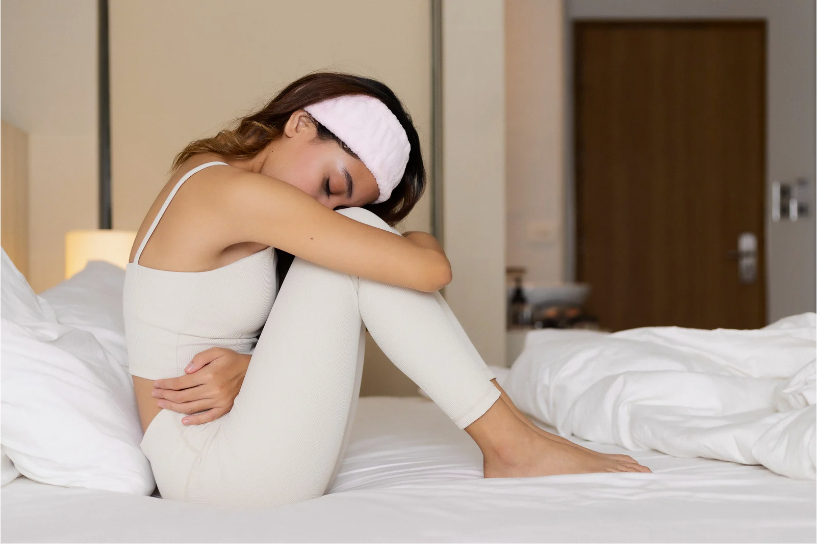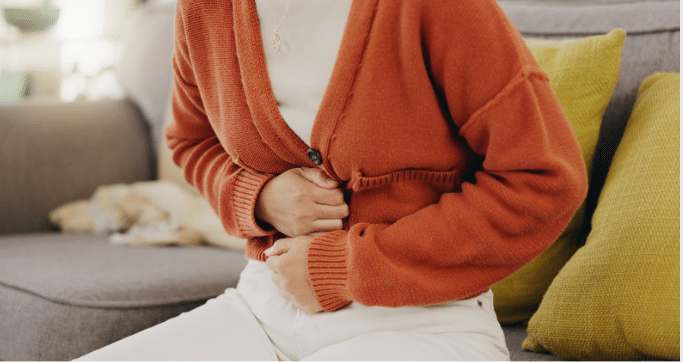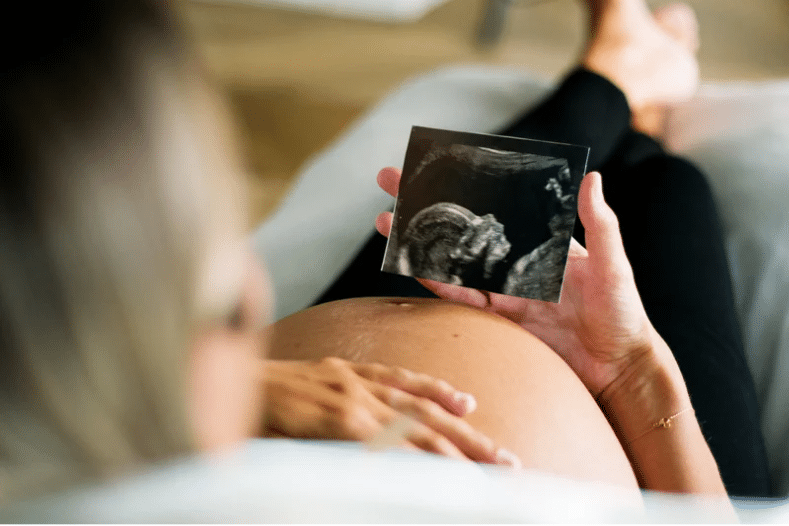Endometriosis
Endometriosis is a painful condition, wherein tissue that is similar to the lining of the uterus grows outside the uterus. For example, this tissue may grow in places like the ovaries, fallopian tubes and the lining of the tummy. Endometriosis tissue can become inflamed, scar, invade other organs, cause organs to stick together and it even produces its own oestrogen. This tissue grows in places where it does not belong, and it does not leave the body.
Endometriosis can affect women of any age but is particularly common in women of childbearing age. It is unlikely to affect women in the early years of their period or after menopause but it still can. Endometriosis affects 1 in 10 women and can impact people on various levels. For some, endometriosis can have a significant negative impact on their wellbeing. However, many can continue to live normally and go about their daily lives.
A survey of 1,500 women conducted by Active Iron for Endometriosis Awareness Month, found that 74% of women with Endometriosis experience heavy periods, with 87% admitting that this negatively impacts their quality of life. Additionally, 41% find their methods to combat fatigue ineffective. Furthermore, 79% of women believe that more should be done to raise awareness of the effects of heavy periods on women’s health.
Active Iron strives to empower women with the knowledge and tools required to effectively manage the tiredness and fatigue that is linked with endometriosis and heavy periods.

Symptoms of Endometriosis
Symptoms of endometriosis vary from person to person and affect everyone differently. However, the most common symptoms of endometriosis are:
- Pain in your Lower Tummy or Back:
This may occur in the days before your period starts and can usually get worse during your period. This type of pain is more intense than “normal” period pain and can be quite hard to manage with basic pain medication. Active Iron’s survey revealed that 76% of women with endometriosis experience pelvic pain.
- Heavy Menstrual Bleeding
Oftentimes, women with endometriosis will suffer from heavy menstrual bleeding, or bleeding between periods. Many will require extra durable menstrual products (pads, tampons, menstrual cups, period underwear etc.), while others may bleed through their clothes. 74% of women with endometriosis suffer from heavy and/or irregular menstrual bleeding according to the Active Iron survey.
- Tiredness & Fatigue
Monthly periods are the most common cause of iron loss among women worldwide and research shows that women of childbearing age need 2X more daily iron than men.
Menstrual blood loss = iron loss = low energy
According to the Active Iron survey, 74% of women with heavy periods suffer from menstrual fatigue, with 87% admitting this negatively impacts their quality of life.
- Period Pain that Stops you from Doing Normal Activities
Many women with endometriosis will experience pain so severe that it inhibits them from carrying out normal activities or causes them to miss social events. Results of the Active Iron survey show that 67% of women with endometriosis say that their period pain stops them from doing normal activities.
- Pain During/After Sex
This is quite common with endometriosis. According to the Active Iron survey, 50% of women with endometriosis experience pain during or after intercourse.
- Difficulty Conceiving
For some women, endometriosis can cause issues with fertility. Many women are not aware that they even have endometriosis, until they face difficulty when trying to conceive. 36% of women with endometriosis had trouble getting pregnant, according to the results of Active Iron’s survey.
Other Symptoms of Endometriosis Include:
- Pain when peeing or pooing during your period.
- Feeling sick
- Bloating
- Constipation/diarrhoea
- Blood in your pee/poo during your period
For some women, endometriosis can have a significant impact on their lives, this may lead to feelings of anxiety and depression. If you are experiencing any of these symptoms of endometriosis or have concern, we recommend you seeking advice from a healthcare professional.

How is Endometriosis Different from Heavy Periods?
After pain, heavy periods are one of the most common symptoms of endometriosis. However, this does not mean that if you have heavy periods, you have endometriosis.
It is difficult to define heavy periods because menstruation is unique to every individual. Heavy menstrual bleeding for one person, may be a “normal” period for someone else.
Signs that you are experiencing heavy periods include:
- Bleeding for longer than 7 days.
- Having to change sanitary products after less than 2 hours.
- Bleeding through clothes or bedding.
- Passing large blood clots – larger than the size of a 50c coin.
- Needing to use two sanitary products together e.g. using a pad & tampon simultaneously.
- Losing 80ml of blood or more, however it is not necessary to measure your blood loss. In most cases, you will know when the amount of blood you are losing is irregular.
In many cases with heavy menstrual bleeding, there is no underlying issue, but for some this may be caused by a specific condition.
Some causes of heavy bleeding are:
- Fibroids – non-cancerous growths that appear in or around the womb.
- Endometriosis – where tissue that is similar to the lining of the uterus grows outside the uterus (ovaries, fallopian tubes or lining of the tummy).
- Polycystic Ovary Syndrome (PCOS) – a hormonal imbalance that occurs when your ovaries produce excess hormones.
- Endometrial Polyps – non-cancerous growths in the lining of the womb or cervix.
- Adenomyosis – when tissue of the womb lining is embedded in the wall of the womb.
- Pelvic Inflammatory Disease (PID) – in infection in the upper genital tact that can cause vaginal bleeding/discharge and pain.
- Cancer of the womb, cervix or vagina.
If you have concerns about your period or are experiencing any of these symptoms, we do advise that you seek guidance from your GP/ healthcare professional.

Common Treatments for Endometriosis
Currently, there is no known cure for endometriosis, but there are several treatments that can help with managing the symptoms. These treatments include:
- Painkillers and anti-inflammatories – ibuprofen, paracetamol etc.
- Hormonal contraceptives – the oral contraceptive pill, contraceptive injection, contraceptive implant.
- Surgery – to remove patches of endometriosis tissue (often keyhole surgery).
Active Iron’s survey results revealed that the following treatments were the most common among women with endometriosis:
- 52% of women said that they use pain medications to manage symptoms.
- 47% of women use contraceptives e.g. the pill, implant or coil, to manage symptoms.
- 42% of women took the surgery route to treat their endometriosis.
Your healthcare professional will discuss treatment options with you and the benefits/risks of each one.
The appropriate treatment will be recommended to you depending on what stage of endometriosis you have. If symptoms are mild, treatment may not be needed at all.

Endometriosis and Pregnancy
Endometriosis is not necessarily a direct cause of infertility; and this is thought to be multifactorial. However it is still possible to conceive with endometriosis and a diagnosis does not mean that you won’t. For some women, they may need treatment of their endometriosis or fertility assistance in order to conceive.
However, there is always a risk that the abnormal tissue caused by endometriosis can inhibit a person’s ability to conceive naturally.
The Impact of Abnormal Tissue Growth when Trying to Conceive:
- Can block the ovaries, which could inhibit the release of eggs.
- Can prevent a fertilised egg from attaching itself to the uterus.
- Can block the fallopian tubes or prevent them from working properly altogether.
Other risks that can cause implications when trying to conceive include inflammation, structural damage to the uterus or hormonal shifts caused by endometriosis.
Often, symptoms of endometriosis like pelvic pain, can decrease during pregnancy. It is always worth keeping in mind that every individual body is different and while some may experience few symptoms during pregnancy, others may experience their symptoms worse than before.
If symptoms stop all together or improve significantly during pregnancy, there is no guarantee that it will remain this way post-partum. With that being said, it is important to understand that pregnancy does not cure endometriosis.
If during pregnancy you are experiencing pain caused by endometriosis, there are ways in which you can manage your discomfort at home.
- Warm baths are always recommended. Not only can they help with pain, but they are also a wonderful way to unwind!
- Get plenty of rest if you can.
- Heat pads.
- Gentle exercise if you are up to it.
- Prenatal yoga/stretching.
- Fibre-rich foods and lots of water, to avoid constipation.

Managing Endometriosis and Self-Care
There are many ways to manage your endometriosis symptoms. While medical treatment may be necessary, there are also ways in which you can help manage symptoms yourself at home.
The following self-care tips and tricks will not cure endometriosis but can help with some of your symptoms and provide comfort during your period/flare ups.
- Balanced Diet – a well-balanced diet can help fight the pain and inflammation caused by endometriosis:
- Foods rich in iron like red meat, fish, spinach, legumes, broccoli
- Foods rich in fibre like fruit, vegetables, whole grains and legumes
- Foods rich in fatty acids like nuts, olive oil, avocados, fish
- Heat – taking a warm bath or placing a heat pack or hot water bottle on your lower tummy can be an excellent way to relieve pain.
- Light Exercise – during your period, the idea of doing exercise may not sound particularly appealing but going for a short walk, doing pelvic floor exercises or some light stretches can help, not only for pain relief but for your mind too.
- Rest – juggling your daily tasks while experiencing an endometriosis flare up or your period can be tough. If you are in a position to do so, you should get as much rest as you can.
- Iron supplementation – introducing an iron supplement into your daily routine can help combat menstrual fatigue. Active Iron is clinically proven to increase iron and energy levels by 94% in 6 weeks and is gentle on the stomach.
As mentioned, these self-care tips are not an endometriosis cure. However, endometriosis and menstruation can lead to feelings of anxiety and depression. Having a self-care routine that works for you can not only help to relieve pain but can also have a positive impact on your psyche.


Dr. Sarah Murphy
Obstetrician & Gynaecologist
Dr Sarah Murphy is an Irish doctor specialising in obstetrics and gynaecology. She is a member of the RCSI and RCPI and has a masters in obstetrics and Gynae, and a diploma in women’s health. She is passionate about women’s health and well-being and ensuring women feel empowered about their own health, specifically gynaecological health.
What Causes Endometriosis?
There is no known cause of endometriosis. However, there are a few theories outlining potential causes:
- Genetics: This condition tends to be hereditary and may be passed down from family members.
- A Problem with the Immune System: The body’s natural defence against illnesses and infections may not be functioning efficiently.
- Retrograde Menstruation: When your period flows up through your fallopian tubes and into your pelvis, instead of leaving the body as a “normal” period would. Over time, this tissue can become inflamed and cause pain.
- Embryonic Cell Changes: Hormones like oestrogen can change embryonic cells – cells in the initial stages of development – into endometrial-like cell growth during the puberty stage.
- Endometrial Cell Transfer: Where endometrial cells get transported to other parts of the body by blood vessels or the tissue fluid system.
How is Endometriosis Diagnosed?
If you are experiencing symptoms of endometriosis, you should discuss this with your GP.
A recent survey carried out by Active Iron revealed that 72% of women with endometriosis consulted with their healthcare professional to receive their diagnosis.
It would be beneficial to keep note of what you are experiencing i.e. symptoms, dates & length of your period etc. This will help establish any trends in your cycle and provide a clear understanding of exactly what you are going through, throughout your cycle.
Your GP may recommend a medication to help alleviate these symptoms. On the other hand, you may need to consult with a gynaecologist who can carry out further tests on you. These may include an ultrasound scan or a laparoscopy.
Laparoscopy: Where a thin tube is passed through a small incision in your tummy. This will identify any patches of endometriosis tissue.
An endometriosis diagnosis can take quite a while (sometimes years) to diagnosis, which is an issue in itself. Once you have received a diagnosis, your healthcare professional will discuss treatments and next steps.
What are the First Signs of Endometriosis?
There are many signs and symptoms of endometriosis.
The most common signs of the condition include:
- Pain in the lower tummy/back
- Severe period pain
- Heavy menstrual bleeding
- Pain during/after sex
While these are all symptoms of endometriosis, this may not mean that you necessarily have endometriosis. However, if you are experiencing any of the mentioned symptoms or your period causes you concern, we recommend you seeking advice from your GP/healthcare professional.
Can Endometriosis Cause Fatigue?
Endometriosis causes heavy periods, which in turn may lead to low iron and fatigue.
The second most common symptom of endometriosis is heavy menstrual bleeding.
Menstruation is the most common cause of low iron among women worldwide and, because of low iron, sufferers will feel tired, fatigued and have low energy levels.
With that being said: Menstrual Blood Loss = Iron Loss = Low Energy
If you suffer from endometriosis or heavy periods and, as a result, feel tiredness and fatigue, it may be time to try out an iron supplement. Active Iron is a clinically proven iron supplement. Our product has been shown to increase iron levels by 94% in 6 weeks and helps to fight tiredness and fatigue while being gentle on the stomach!
Can Endometriosis Cause Infertility?
There is a risk of endometriosis leading to problems with fertility. The reason for this is not fully known, due to lack of research. However, even in the most severe cases of endometriosis, natural conception is still possible.
If you suffer from endometriosis and are planning to conceive or are having difficulty conceiving, seeking advice from your healthcare professional is recommended.

